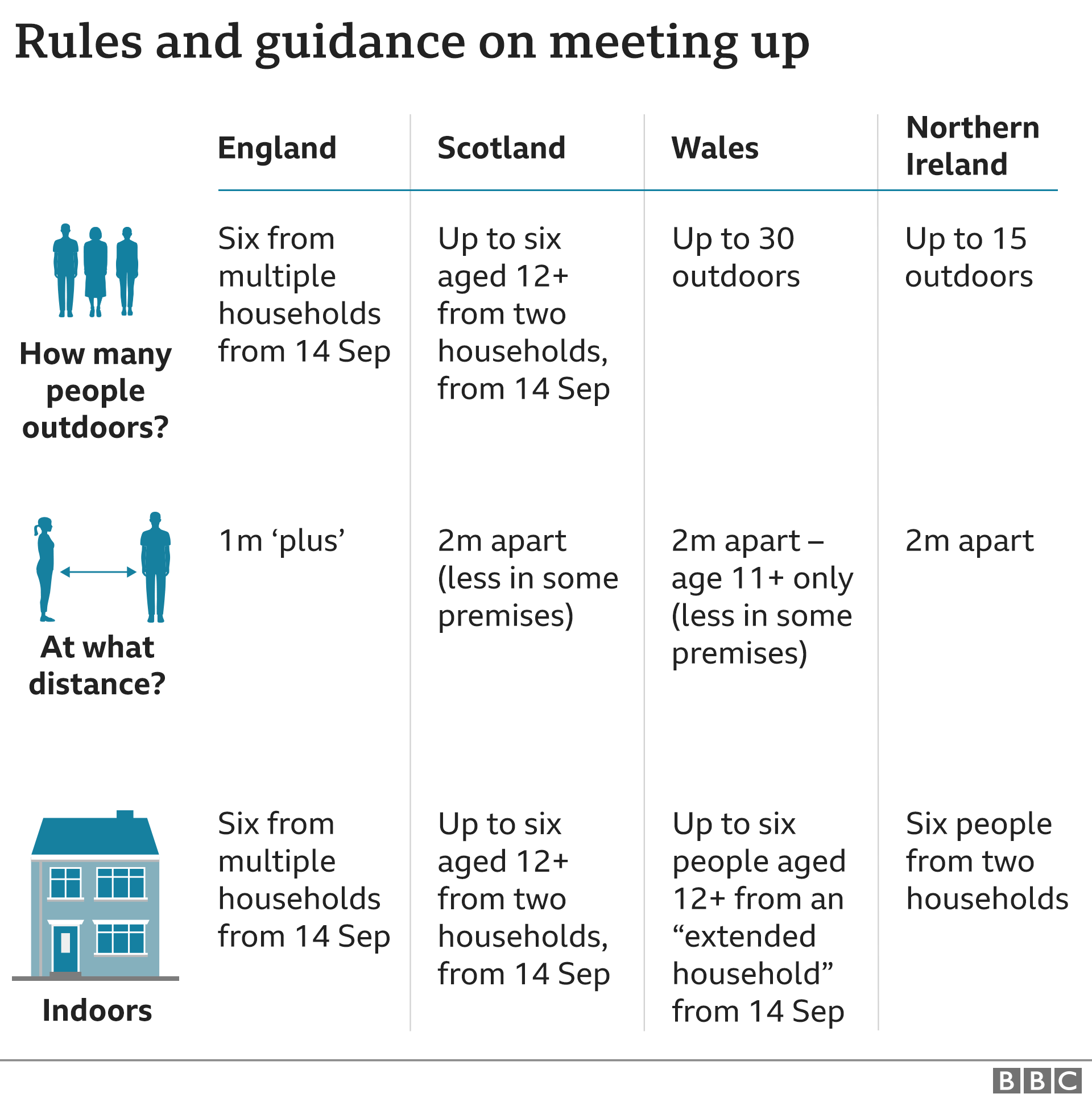What are the new rules for socialising?
In England, the limit of six people from multiple households starts on Monday.
It will apply both indoors and outdoors and to all ages.
So, gatherings in private homes, venues like pubs and restaurants, and in outdoor spaces like parks will all be affected.
In Scotland, a maximum of six people from two households can meet from Monday. Unlike England, children under 12 – from those two households – will not be included.
In Wales, from Monday it will be illegal for more than six people from an extended household to meet indoors. The rule will not apply to children aged 11 and under. Up to 30 people from different homes can still meet outside.

Northern Ireland has not announced any changes.
Will any social events of more than six be allowed?
Some gatherings of more than six people will be allowed in England, for example:
- If your household or support bubble is larger than six
- Education and training settings
- Workplaces
- Protests and political events, if compliant with safety guidelines
- Jury duty or other legal commitments
- Children’s play groups and youth clubs
- Support groups, such as for addiction or abuse
- Playing sport – either professionally or for fun
Weddings, funerals, and very special religious occasions, such as christenings or bar mitzvahs, can go ahead with up to 30 people attending, in groups of six or less. However, celebrations after the religious ceremony are limited only to weddings or civil partnerships.
If you live in a household of more than six you can gather in public or private. However, you will not be able to join with anyone from outside of your household.
Can I still go to the pub or to a place of worship?
Yes. Pubs, restaurants, shops and other venues will remain open, and there is no limit on how many can enter them, as long as they comply with safety rules and allow for social distancing.
However, each individual group inside the pub can have no more than six people in it.
Venues should also allow for social distancing between groups.
Similarly, places of worship can have as many people in them as is safe to do so. However, people can only attend in groups of six or less.
What are the rules for sports?
You can play organised indoor and outdoor sports in groups of more than six, as long as the sport’s governing body has published guidance on how to do so safely.
But if you are playing sports informally with people you don’t live with, you must not play with more than six people.
Group exercise classes are also exempt from the rule of six, where they are being organised under Covid-secure guidelines.
Can I be fined for breaking the rules?
The new measures will mean groups larger than six can be broken up by police.
Members of the group can be fined if they fail to follow the rules. This will be £100 for a first offence, doubling on each further offence up to £3,200.
The government says: “Putting the new, lower limit in law will make it easier for the police to identify and disperse illegal gatherings.
What is the guidance on social distancing?
Each UK nation is advising people to stay 2m (6ft) away from anyone they don’t live with. However, there are some differences:
- In England, if it’s not possible to be 2m away, you can stay “1m plus” apart. The “plus” means doing something else to limit your possible exposure – like wearing a face covering
- In Scotland, there are exemptions to the 2m rule in some places – such as pubs and restaurants. Children aged 11 or under do not need to social distance
- In Wales, the 2m guidance reflects the fact it’s not realistic to stay that far apart somewhere like a hairdresser’s. Primary age children in Wales are also exempt
- Northern Ireland‘s guidance was 1m (3ft) for a time, but is now back at 2m
Image copyright Getty Images
What about shopping or public transport?
Face coverings are compulsory if you are using public transport across the UK.
Some people are exempt, such as those with certain medical conditions.
Coverings must be worn in shops in England, Scotland and Northern Ireland – and will be compulsory from Monday in Wales.
Shop workers are exempt.
What if I get symptoms?
You should self-isolate by staying at home for 10 days and arrange to get tested.
The symptoms are:
- new continuous cough
- high temperature
- loss of, or change in, your normal sense of taste or smell
If your test is positive, you must complete the remainder of your 10-day self-isolation. Anyone you live with should self isolate for 14 days (from the time you started having symptoms).
Contact tracers will also get in touch with people with positive results.
Do I have to social distance myself from everyone?
The only people you do not have to distance yourself from are those you live with or, if you are in England, Scotland or Northern Ireland, people in your support bubble.
Single adults living alone or single parents with children under 18 can “bubble” with one other household of any size with no social distancing.
In Wales, you do not have to social distance if you are in an “extended household”.


